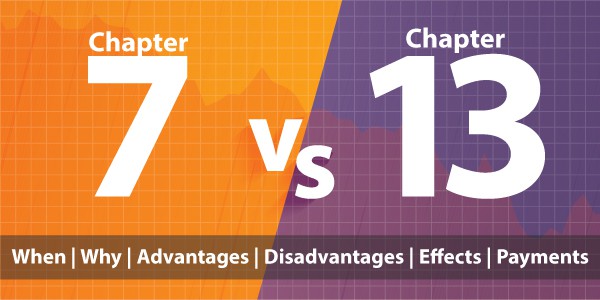Filing for bankruptcy is one of the toughest financial decisions to make for any individual, and once decided, which option to choose is another confusing job. If you are going to file for personal bankruptcy, you have options like Chapter 7 and Chapter 13 bankruptcy. However, in order to choose the right option for your specific condition, you should have a thorough understanding of the ins and outs of each option. Sometimes, even the guidance of an experienced bankruptcy attorney may be necessary to get going with the best option. Below given is a careful comparison of both of the options. Read on and choose the most suitable for you.
| Chapter 7: Straight liquidation bankruptcy | Chapter 13: Court approved payment plan |
|---|---|
When you can opt: | |
|
|
Advantages | |
|
|
Disadvantages | |
|
|
Who can file? | |
|
Individuals who have qualified under the ‘means test’, earn less than the state determined median income, and has completed the mandatory credit counseling and budget analysis are eligible to file for Chapter 7 bankruptcy. |
Anyone:
|
Frequency | |
|
If you already filed Chapter 7 bankruptcy in the past, you have to wait for another 8 years to file again. |
Your plea for Chapter 13 discharge won’t be granted if you already received a discharge in Chapter 7,11, or 12 four years before or more or in Chapter 13 two years before. |
Effect on your assets and liabilities | |
|
On debt: Apart from a few exceptions (e.g., federal student loans, child support, alimony), most debts are discharged upon successful completion of the bankruptcy procedure. |
On debt: All or a portion of the debts (except tax debts, or debt due to breach of Contract or Negligence) may be discharged and the rest has to be paid off as per the court-approved payment plan. |
|
On home: In any circumstance, you must keep up with your mortgage payments if you want to preserve your home. If you stay updated on your payments, your home may be preserved under the homestead exemption. You also have a few other options. You can surrender or redeem your property. |
On home: Home will be preserved if the Chapter 13 plan is properly carried out and if there is no substantial non-exempt equity. |
|
On nonexempt assets: All nonexempt assets must be surrendered for liquidation and thereafter, distribution. |
On nonexempt assets: There won’t be any problem if the court-approved repayment plan is successfully carried out. If not, the debtor’s nonexempt assets are sold to pay creditors, just like in Chapter 7 bankruptcy. |
Payments | |
|
Most debts are discharged in Chapter 7 bankruptcy except federal student loans, taxes, child support, and alimony. |
The disposable income of the debtor is available for payment. However, what is reasonable to pay each month is completely determined by the court. |
Effect on credit | |
|
Chapter 7 bankruptcy filing induces an initial negative impact on your credit score and stays there in your credit file for up to ten years from the date of filing. |
Record of filing Chapter 13 bankruptcy would stay there in your credit report for up to 7 years from the date of filing. However, after the time-span is over, all negative items must be removed from your credit report. |
Conclusion
Both chapter 7 and 13 bankruptcy have their advantages and disadvantages. However, if you make a comparative analysis between the two, then you will understand that chapter 7 is less complicated than chapter 13 bankruptcy. Furthermore, you can file for chapter 7 bankruptcy on your own. But if you want to file for chapter 13 bankruptcy, you have to get help from an attorney and the process is complex. Moreover, you have to navigate the process for 3 to 5 years. An experienced bankruptcy attorney can help you abide by the rules and discharge your debts. Here’s how you can find the right attorney for yourself.









